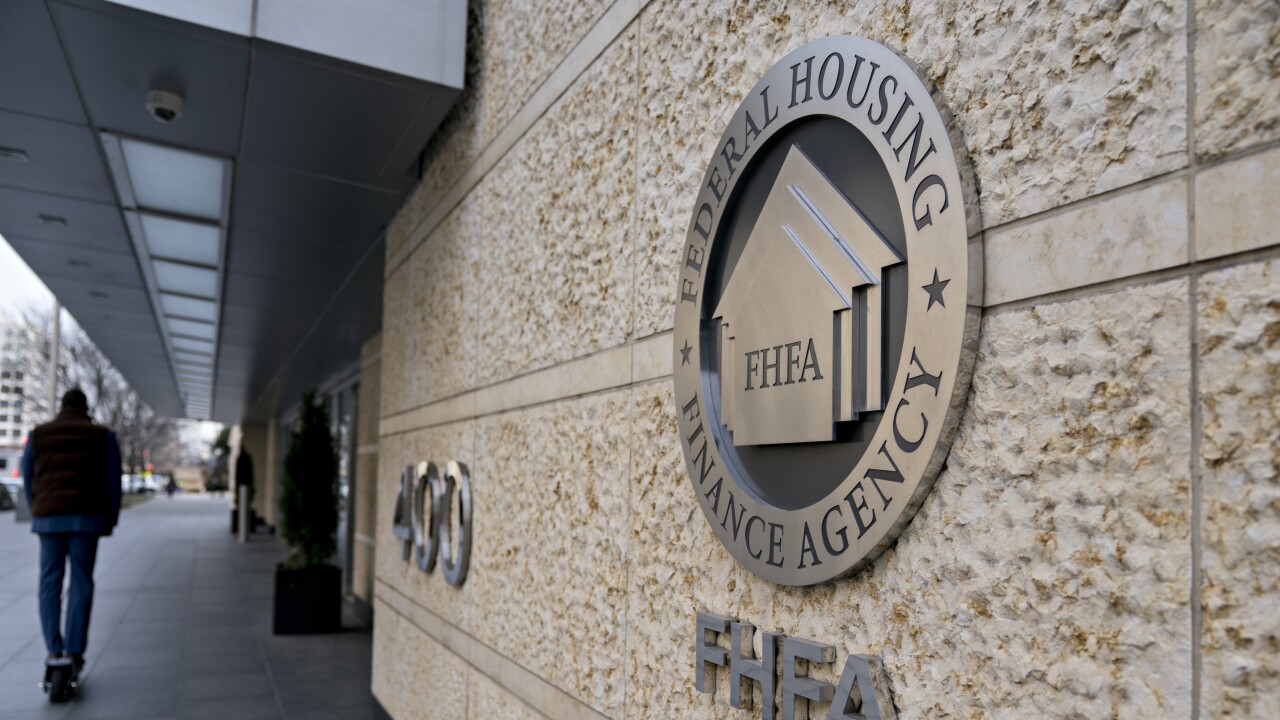-
A trade group is looking into why New York Gov. Andrew Cuomo felt foreclosure risks were too high to sign a bill that would have approved reverse mortgages for cooperative properties.
December 26 -
Eric Blankenstein, who resigned from the Consumer Financial Protection Bureau in May after the discovery of his racially charged writings, was named acting executive vice president of Ginnie Mae.
November 8 -
The Federal Housing Administration chief has already been serving as the acting deputy secretary of the Department of Housing and Urban Development.
October 8 -
The proposed reforms of Fannie Mae and Freddie Mac have gotten all the attention, but the administration also wants to scale back the Federal Housing Administration, expand its capital cushion and adopt risk-based pricing. Some of the ideas have former agency officials concerned.
September 19 -
The bureau issued three policies removing the threat of legal liability for approved companies that test new products.
September 10 -
The mortgage industry will be looking for answers when Treasury and HUD unveil reports on housing finance reform, but the Trump administration’s plans could also raise a whole new host of questions.
August 29 -
The Federal Housing Administration updated its lender certification proposal originally issued this past May, as it looks to ease industry concerns on False Claims Act enforcement.
August 15 -
The Federal Housing Administration is aiming to limit the share of borrowers who have been withdrawing money from the value of their homes.
August 1 -
Treasury and HUD are close to unveiling administrative and legislative options for ending the conservatorships of Fannie Mae and Freddie Mac. Will their findings be heavy on detail or leave a lot unanswered?
July 9 -
Mortgage lenders might be feeling a little less stressed over False Claims Act actions being brought against them following recent headlines but there is still some work to be done before they can chill out.
July 2 -
Sen. Elizabeth Warren said Eric Blankenstein's past writings disqualify him from working at the Department of Housing and Urban Development.
June 24 -
The little-known unit was launched in the wake of efforts by the CFPB and HUD to cut back on fair-lending activities, but the reach of the 10-month-old office is still unclear.
June 18 -
His administration is looking at different alternatives to reform the housing finance system.
May 17 -
The Government Accountability Office called on Ginnie Mae to undertake four reforms to its operations, citing concerns regarding the ongoing shift in size and capitalization of mortgage-backed securities issuers.
May 10 -
The Trump administration is cracking down on national affordable housing programs because of concern over growing risk to the government's almost $1.3 trillion portfolio of federally insured mortgages.
April 22 -
The secretary of housing and urban development plans to "finish out this term" but wants to return to "the private sector because I think you have just as much influence, maybe more."
March 5 -
A lapse in rental-assistance funding, an understaffed FHA and other effects of the government shutdown are causing real harm to families, said the chair of the House Financial Services Committee.
January 11 -
Michael Bright is resigning as acting president of Ginnie Mae to run the Structured Finance Industry Group, a trade association that's been without a CEO since Richard Johns resigned in July amid a reported split with the group's board.
January 10 -
Acting Ginnie Mae President Michael Bright will leave his post on Jan. 16 and will no longer seek confirmation to be the permanent head of the mortgage secondary market agency.
January 9 -
Borrowers and financial institutions may be feeling the strain from reduced operations at the FHA and IRS, which has suspended the release of certain income documentation during the budget impasse.
January 4
















